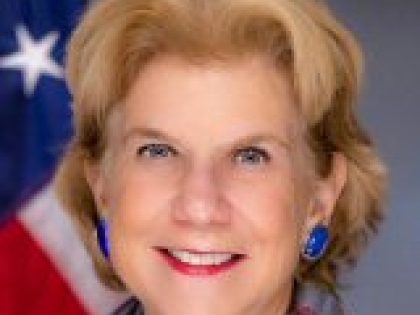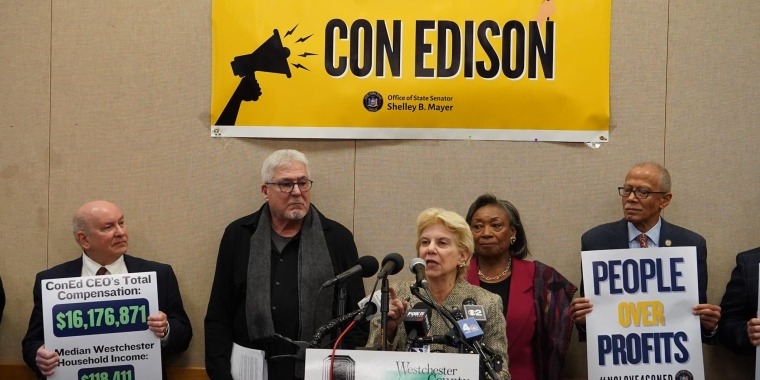
New York State Continues to Lead the Way in Education Innovation through P-TECH Schools
Shelley B. Mayer
August 9, 2022
This article first appeared on the Albert Shanker Institute blog.
New York State Senator and Chair of the New York State Senate Education Committee Shelley B. Mayer discusses her state's leadership in educational innovation and policies, particularly in the development of the Pathways in Technology Early College High School Program or P-TECH which are school to career programs that create a successful pathway from high school to college to career.
New York State has long been a leader in educational innovation and policies. In 1890, New York City’s first kindergarten was established; and, after World War II, New York State was one of the first states in the union to make high school mandatory. And while New York State continues to lead, particularly with a focus on equity for all students, regardless of zip code, we know we have more work to do.
Among our recent achievements, in 2021 and again in 2022, New York State finally fulfilled its promise of full funding under the Foundation Aid Formula. It was established almost 15 years ago based on the promise of a “sound basic education,” and as a way to depoliticize the funding of public education and base state funding for public schools on quantifiable need. And equally important, with strong leadership from the Senate Majority Leader Andrea Stewart-Cousins and Speaker Carl Heastie, NYS has now begun to greatly expand full day Pre-k for 4 year old’s to hundreds more school districts, while New York City already led the way with federal funding and then local funding for full day Pre-K for all 4 year old’s several years ago.
New York State has also led with the development of innovative school to career programs that create a successful pathway from high school to college to career. The P-TECH program, or Pathways in Technology Early College High School Program, continues to grow stronger and expand to more districts. I am proud to support this program, which provides a grade 9-14 combined high school and community college program linked directly to real career opportunities. P-TECH began in New York City over 14 years ago and now has been replicated across New York State. Former President Barack Obama featured P-TECH in his 2015 State of the Union address and came to visit the initial school in Brooklyn, New York. And as a further sign of success, New York State’s P-TECH innovative model has spread now across 13 states and 28 countries with large numbers of P-TECH schools in Texas, Maryland and Colorado and other countries, including Australia, Hong Kong, Ireland, France and Taiwan.
The need for effective pathways from school, to college, and on to well-paying careers has been one of the greatest educational challenges of our time. The barriers between our Pre-K-12 and postsecondary institutions and the business community--which needs well-educated, motivated and prepared students to join the workforce--continues to be a challenge in every community. As we recommit ourselves to ensuring every child has a chance to succeed after high school, we know we need to invest in successful new approaches, such as P-TECH.
In an article in “Insider” in 2016, the first P-TECH school in Brooklyn was noted as among the 14 most innovative and effective schools in the US. What is the reason? First, it is open to all students with no screening for admissions. Second, it is a grade 9 to 14 school, where students experience a scope and sequence of courses that connect high school to college classes, resulting not only in a high school diploma but an Associate’s Degree in fields like cybersecurity, biotechnology and electromechanical engineering. Third, students were supported and coached to succeed in jobs with fully engaged business partners, such as IBM, Corning, Global Foundries and Tesla, whose employees mentored and encouraged students to stay with their academic and employment opportunities. Fourth, students completed high school with college credits without college debt!
Randi Weingarten, President of both the American Federation of Teachers (AFT) and of the Albert Shanker Institute, visited P-TECH when the school first opened in Brooklyn. Recently, she wrote that “innovative models such as P-TECH offer a ladder of opportunity, a path out of poverty and a long leap toward a more equitable future. P-TECH is a change agent.” Weingarten went on to say, “When a college education, necessary now more than ever, too often is a pipe dream, P-TECH delivers it totally free for all students.”
Importantly, the data shows that P-TECH schools are successful in keeping students on a meaningful path towards high school graduation and a college degree. An independent evaluation recently completed by Manpower Development Research Corporation (MDRC) looked at seven P-TECH schools located in New York City and found that P-TECH graduates were 30% more likely to complete their college courses and significantly more likely to pass state Regents’ exams than similarly situated students not enrolled in P-TECH programs. Recently, a college completion assessment prepared by the State University of New York (SUNY) for its community colleges throughout the State that partner with P-TECH schools was even more encouraging. According to the SUNY data, of the initial cohort of 500 students that began in 2014, roughly 40% completed their SUNY associate degrees six years later, higher completion rates than SUNY students overall. That’s another challenge we must address.
There are now more than 2,500 students enrolled in P-TECH schools and in SUNY institutions, with close to 450 who have already received their Associate degrees. Given that national data shows that 87% of students who obtain at least 30 college credits are likely to complete their degrees, I anticipate that the P-TECH college completion rates will continue to grow.
I’m proud to be the sponsor of a bill in the New York State Legislature which will codify the P-TECH program in New York’s Education Law, and I will continue to fight for funding for these important and innovative programs that serve so many of New York’s diverse and capable students. I’ll keep pushing for these kids and every model that works to help students succeed. They deserve no less, and New York State is committed to making sure successful programs happen.
Share this Article or Press Release
Newsroom
Go to Newsroom
Con Ed Rate Hike Rally at Westchester County Center
February 18, 2025
What’s Next for Reproductive Rights, Hochul’s State Agenda
February 18, 2025
Students Pose Questions to Lawmakers at PTC Breakfast
February 11, 2025